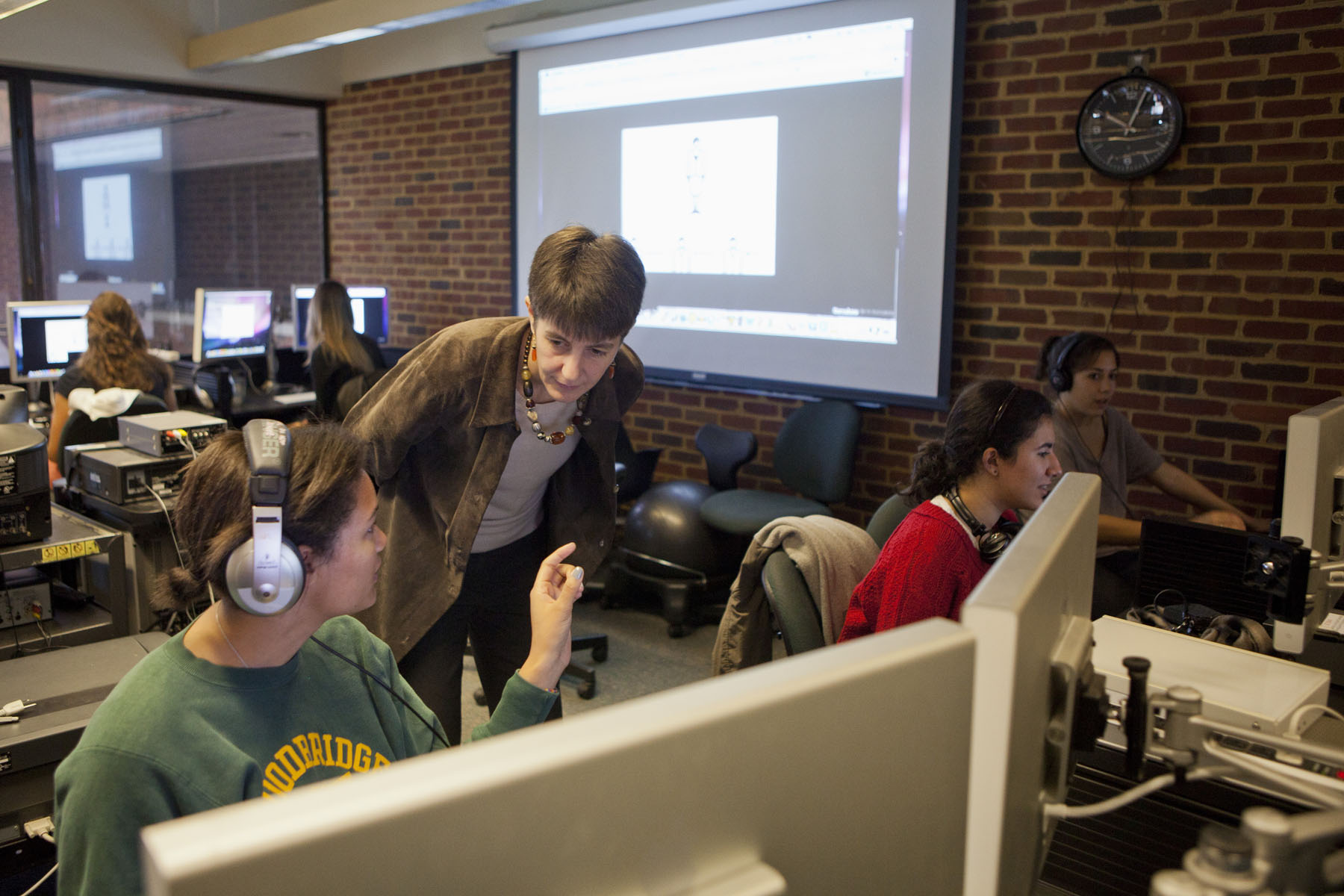University of Virginia students crowd around video cameras and editing software in the Digital Media Lab. They greet each other with "bonjour" instead of "hello," then continue in French as they discuss their documentary film.
They are in a new French language and literature course in the College of Arts & Sciences called "Reel Life Stories." Designed and taught by associate French professor Alison Levine, it bridges the gap between foreign language and filmmaking.
Levine developed her passion for film during graduate school when she worked for video production companies in France and the United States. In the early 1990s, she made two films – one analyzing Louisiana's French-language speakers and another focusing on Haitian immigrants in Richmond.
U.Va. created a position that fulfilled Levine's dream job – a French professorship that examines the importance of texts and images and how these two, together, can link film and cultural history. After seeing the job description, the Charlottesville native had to return home, she said.
"Reel Life Stories" involves both filmmaking and film analysis. "What is unique about Professor Levine's class and general approach to cinema is that she regularly invites her students to experience artistic creation while simultaneously learning to critique it," French Department chair Deborah McGrady said.
"Reel Life Stories" lets "students have a chance to apply cinematic techniques in telling their own and their community's stories," McGrady added.
Documentaries, in particular, have always fascinated Levine.
"I think documentary is a unique and interesting form because it speaks to us about the real world, the one we live in," she said. "Yet, it uses the same forms we find in fiction," including scripts, frame shots and staged scenes, in an effort to portray something genuine about the world.
The course is equal parts theory and practice. Students read and write, but also spend substantial time in the studio, learning about cinematography, interviewing and filmmaking. As a final project, each group in the class will create a documentary answering the question, "Pourquoi le français (Why French?)"
The students have complete freedom on this project, Levine said. She just wants to hear why her students study and love French, or why they think French is important in the world today. "I don't yet know what they will do with this, but I hope I have opened up enough space for them to be creative," she said.
Levine said she would be unable to run this course alone, and credits the Digital Media Lab staff for teaching her students the technical skills necessary to produce films. "Without them, I would not have been able to dream this course at all," she said.
While "Reel Life Stories" does teach technical cinematic skills, Levine explained that the course is not about creating filmmakers; it is about learning how to digest documentary as both a filmmaker and a critic.
"A lot of what we know about the world comes to us through documentary forms," she said. "There's an urgency for us to be critical readers and consumers of those media sources."
McGrady said there is no better way "to create globally responsible citizens than by teaching them to view the world as a vast documentary waiting to be filmed."
Levine's students, whom she calls "pioneers" for taking part in one of the few courses to bring film and language together, said the professor's passion and teaching style make "Reel Life Stories" a powerful course.
"We all do so much better than we would in a typical lecture-style class because we are asked to be the main actors in our learning process," fourth-year French and comparative literature major Courtenay Selden said. "By putting us in the position of the director, this class lets us merge our academic and practical knowledge in a way that deepens our understanding of the material."
Selden noted that the course's format creates an energy not always found in lecture-based classes. The students, who work in small groups, often spend their weekends working on the projects. "We get to know our classmates outside of a classroom setting, which makes us all feel more connected to the class and gives us a really great class dynamic when we are in class," she said.
McGrady said that while Levine's teaching format is rather experimental, active learning is common in the French department.
"If you walk the halls of Cabell and peek into a French language, culture or literature class, you will find students performing skits, sharing creative and research-based work, teaching their classmates and debating with professors," she said. "And, thanks to Professor Levine, you will see them out in the streets of Charlottesville and across Grounds filming and narrating life experiences."
Media Contact
Article Information
November 9, 2011
/content/innovative-french-course-brings-film-language-and-students-together

